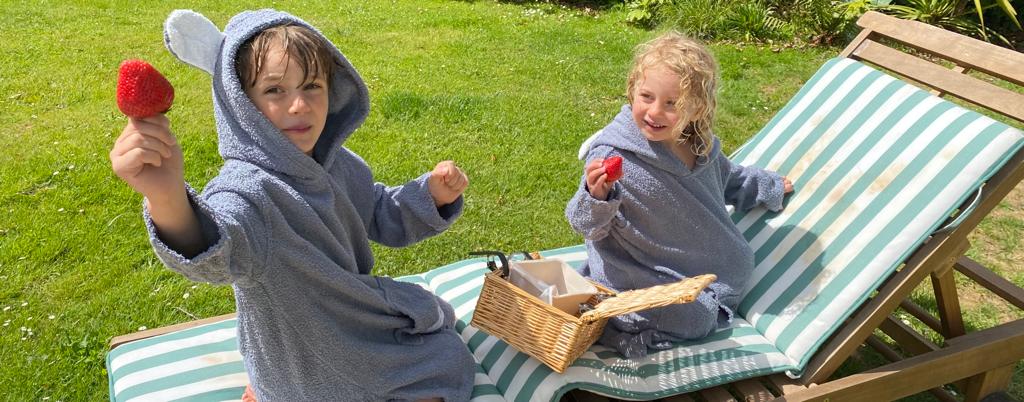For national bed month, we’ve teamed up with the brilliant Sophie Bertrand to fill us in on the best foods to eat to help babies and kids sleep.
The blog post below is written by Sophie, a registered nutritionist, co-host and co-author of Forking Wellness, owner of a nutrition consultancy.

We all love sleep, and we all NEED sleep! In fact, it is one of the biggest foundations of one’s health. Sleep helps optimise our mood, mental health, developmental health and energy, just to name a few. And it is important during all stages of life. It is important to note that there is not one miracle food that will guarantee a good night’s sleep, but there is some evidence behind some specific foods and nutrients that may help.
Nutrition plays a huge role in how babies and toddlers sleep. Some foods before bed can increase a child’s blood sugar which can increase their stress levels. This hinders the production of the sleepy hormone, melatonin which can disrupt their sleep patterns.
The timing of meals can also affect your baby’s sleep. Try to avoid large meals 2 hours before bed as larger meals promote digestion which can also disrupt the sleepy hormone melatonin.
Now, if you are a parent and are unable to get as many hours as you’d like because your child is not sleeping properly, I am going to share some evidence-based research in regard to diet and sleep in hope that the whole family can start optimising their ability to rest!
Wholegrains:
Wholegrain rice, brown bread and oats are good sources of complex carbohydrates which contain fibre and are slowing releasing than simple carbs. Research suggests that wholegrain carbs keep you feeling fuller for longer and might help reduce nighttime wakings.
Nut butters:
These are a great source of nutrients such as essential fats, protein, fibre and antioxidants. Nuts also contain tryptophan which helps make melatonin and serotonin. Melatonin helps regulate the sleep-wake cycle, and serotonin is thought to help regulate appetite, sleep, mood, and pain.
Make sure you opt for nut butter which is 100% nuts and doesn’t have any additives in it.
Dairy such as milk or yoghurt:
As well as being rich sources of calcium, these foods also contain tryptophan. Tryptophan is also found in eggs, tofu and salmon. Tryptophan is a key amino acid which promotes sleep.
Bananas:
Bananas are rich in potassium. This is an important mineral and a natural muscle relaxant. One study suggests that potassium levels also play a role in promoting the production of the sleepy hormone, melatonin and in aiding quality sleep.
Dark green vegetables:
Green vegs such as spinach, kale and broccoli contain magnesium which helps aid relaxation and a good night’s sleep.
There are many different factors that might affect one’s ability to sleep well such as energy levels, environment, mood, etc. So if you have serious concerns about lack of sleep, please seek further advice from your GP or sleep consultant.
Lastly, if you have a fussy eater on your hands, do not stress. Keep offering them variety and try not to lose patience with them or force them to eat because this will not help. You can check out my ebook which provides various tips for fussy eaters. https://sophiebertrand.com/product/healthy-mama-healthy-baby/

About the author: Sophie Bertrand is a Registered Nutritionist, co-host and co-author of Forking Wellness, owner of a nutrition consultancy and mama to son Romeo. Sophie’s aim is to empower you to prioritise your health in an easy and sustainable way. Through the resources she provides via her Instagram, books, podcast and website, you will find easy and well-balanced recipes and a variety of ways in which you can support you and your family’s health. Visit her website here

Recent Comments